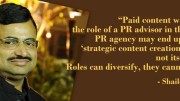Today, unless news is sensational or ‘spicy’, it does not attract TRPs. Conflict is exactly what makes news. If you watch the news in primetime, any night, you will notice that conflict is the common theme that fires every news item. Whether it’s one political party opposing another political party, a politician opposing another, environmental issues, corporate or brands battling one another, a bizarre crime and so on.
And, when anyone faces a crisis situation or you have a contentious issue that leads to a media confrontation, it’s common to see people responding with – “No comments”. Taking a reality check, a no comments response may not really help. In fact, it may only worsen the situation! Your no comment message will still be sending a message to your audience, but it may not be the correct one. ‘No comment’ equals ‘guilty’, and people will speculate and assume there is something that needs to be hidden from the public eye. What is worse, is that media may still run this story with or without your help; moreover, they may get comments from the ‘other’ party, your competitor, your opponent, previous employees or whoever. ‘No comment’ definitely prompts more interest, more questions and loads of speculation. And, the stories that journalists will invariably file anyway, will contain any available and often, potentially damaging comments! Which, incidentally, may land you in a deeper soup!
Most PR veterans recommend that spokespersons avoid saying no comment to the media in almost all tricky situations. In rare instances, a ‘no comment’ can produce gains, at least in the short term. And, silence or lack of any response in social media, may prompt an explosion of speculations! Usually, however, no comment only prompts negative reactions from both the public and media.
Conventional wisdom for media interviews is that you never say no comment when a reporter asks you a question you can’t or don’t want to answer. Always have an answer.
Cannot reveal information? What should a spokesperson say?
Sometimes spokespeople cannot answer a reporter’s question even if they know the answer due to legal, regulatory or privacy issues. For those situations, learn to say ‘no comment’ without actually saying ‘no comment.’ Here are some options:
- You can deflect the question
The rule of thumb for responding to media is – to explain why you can’t respond and use one of your key messages. You can resort to ‘bridging’ ie saying a phrase or sentence that transfers the question to your key message. You can use a common bridging phrase – “That’s an excellent question”, giving the impression the interviewee is seriously considering the question, or perhaps say: “I’m not in a position to talk about this specifically…” and then, go on to relay your organisation’s general policies, goals and commitment to resolve the issue at hand.
- Explain why you can’t answer
You can politely explain why you cannot answer (even when you know the answer). The reasons could be due to confidentiality, prematurity, privacy, litigation concerns or disclosure regulations. Any response is better than no comment, a PR expert would say.
- Display a desire to cooperate
Without sounding rude or impatient, say something like: “I wish I could comment on that (or “help you,” or “share that information with you.” This definitely expresses a desire to cooperate.
- Prepare response pattern
A conflict or a crisis may surface anytime, without warning. So, prepare responses to all possible contingencies, such as breaking industry news, company growth or loss, and supply chain issues. Check out with the top management, and have corporate leaders approve the stock answers, so that you can immediately send out answers.
- Train spokespersons
Educate spokespersons about media interactions. Prepare questionnaires, conduct mock-interviews with different journalist personas, as different interviewers have different styles. Without formal media training, approved responses may not have any impact!
And, after the conflict, it’s essential to gauge the effectiveness of your company’s responses. There can be many learnings here. This can help you deal with such situations better in future (of course the storylines may be different, but you will be wiser!)
So, the bottomline is – avoid no comment, avoid a media relations disaster!










Be the first to comment on "Avoid saying ‘No Comments’"